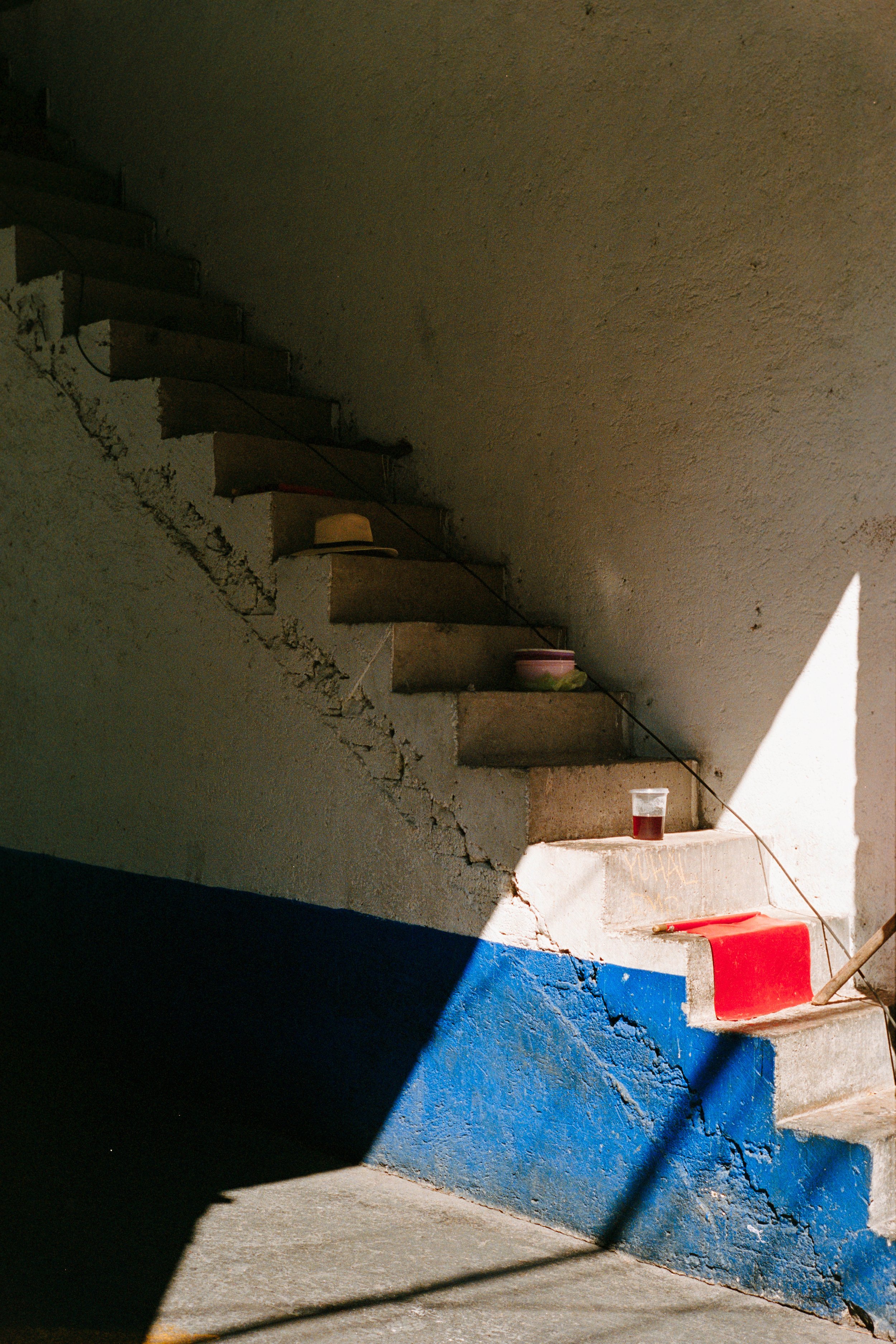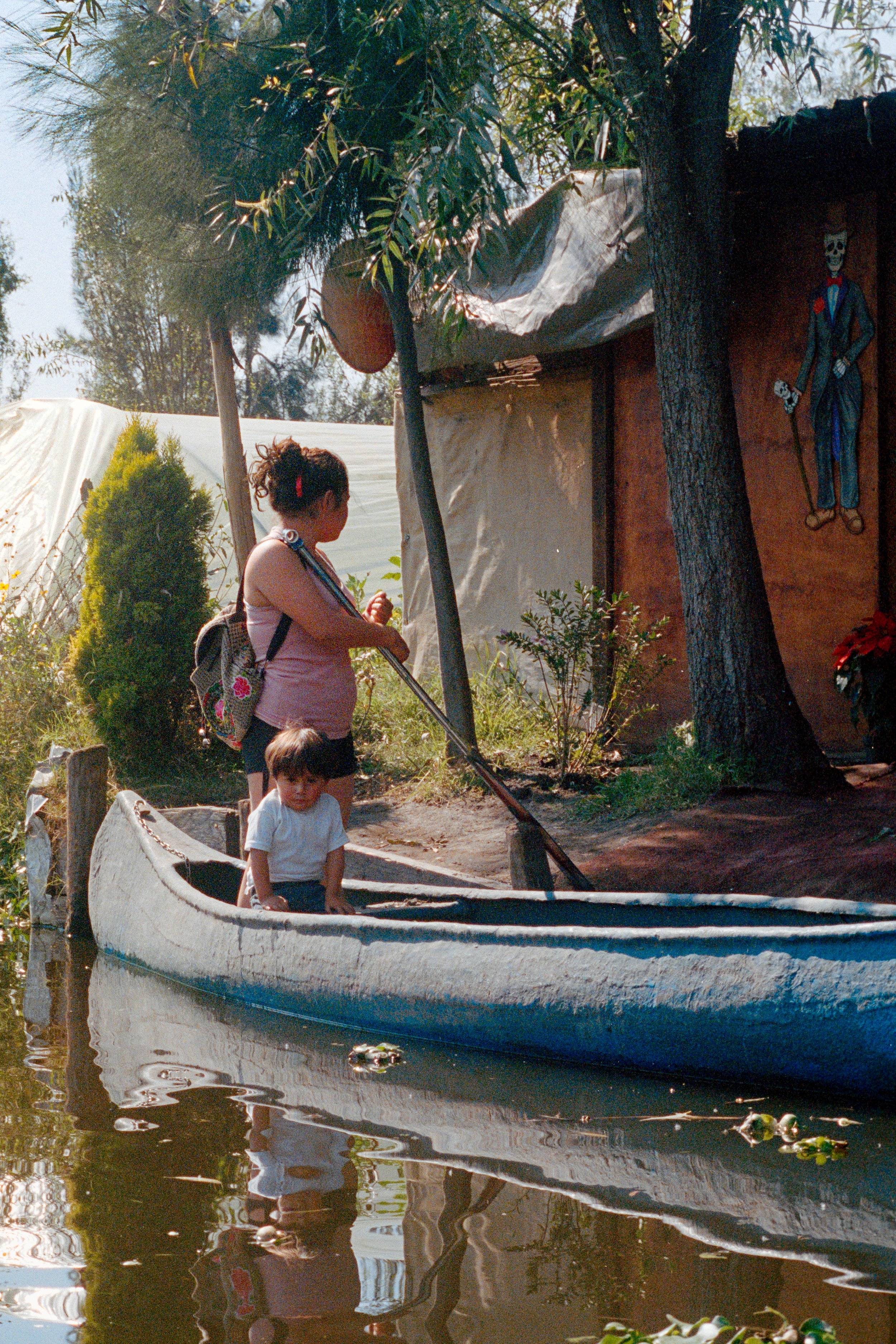Maps for the Middle Aged
There’s a special kind of guilt that creeps in when you realize you’ve crossed a line you swore you’d never touch.
I think mine hit the moment I ordered takeout pizza — from Domino’s, of all places — after picking up some kind of bug from one of the dozen Americans I’d been stuck in line with, waiting to pay stupid sums for fancy cocktails.
I stared at the empty pizza box and bottle of Coke and thought:
This is it. This is who I am now.
Not that scrappy kid who could land in a new city with nothing but a camera and a few bucks in his pocket.
Not that brave, wide-eyed southern boy who once took to the air and found himself dropped into one of the biggest cities in the world — no plan, no clue, just stubborn momentum.
No.
Now I’m the man who flies boarding group A, paid for with credit card points.
The man who books tours off an app.
The man who quietly panics when a restaurant doesn’t have a working bathroom.
Welcome to Mexico City.
Welcome to my middle age.
It all started so easily. A few taps on an app, a few hundred dollars gone, and our whole week stretched ahead like a pre-packaged adventure kit.
Balloon rides over Teotihuacán, spa adventure at natural hot springs, a river cruise and cooking class that promised "local flavor" and "authentic experience" in bold, happy fonts.
At three in the morning, April and I dragged ourselves into an Uber, headed for a rendezvous under the angel statue downtown.
The van waiting for us was small, crammed tight, filled almost entirely with Californians.
Flew two thousand miles just to hang out with people from Fremont, I thought, and immediately hated myself for thinking it.
The ruins were beautiful — impossibly old stones clawing toward a pink dawn sky — but the rhythm was familiar: herd off the van, snap your photos, herd into the gift shop.
The vendors smiled at us with weary, professional patience.
Another busload. Another set of wallets.
My wife and I bought the overpriced photo package and colorful fridge magnets.
I told myself it was “supporting the local economy.”
I knew it was guilt.
In the quiet moments between stops, when the guide wasn’t reciting history fast enough to make your head spin, I felt it: that hollow thud in my chest.
The sense that I was moving through the city like a ghost, brushing past its skin but never getting inside.
April loves to sleep in.
It’s one of her best qualities.
It meant I had the mornings to myself — and maybe, just maybe, a chance to outrun the tourist version of me.
I grabbed my camera, shoved a few pesos into my pocket, and just... walked.
Down cobbled streets so battered and beautiful they looked like the ankles of a hundred-year-old dancer.
Past sidewalk markets where grandmothers laughed and shouted and didn’t seem to notice me at all — which was exactly what I wanted.
There’s a kind of learning that only happens through wandering. No brochures, no guided monologues.
Just you, and the rising smell of fresh tamales, and the snap of laundry swinging over cracked rooftops.
The more I wandered, the more I remembered how to listen.
How to watch a city wake up.
How to be small and invisible and curious again.
These mornings were my first small victories.
They were proof that whatever brave, hungry part of me I thought had died somewhere in the salaryman years — maybe it was just sleeping.
Maybe it just needed sunlight and blisters and bad coffee from a plastic cup to come back to life.
The hot springs were a requirement for my wife.
The photos looked almost too good to be true — impossibly turquoise pools hanging off the side of a cliff, steam curling into the mountain air.
Reality, as it tends to be, was a little messier.
The springs were warm, not hot. Warm like a decent bath that’s been sitting too long.
But the setting — that setting — made it feel like magic anyway.
Terraced pools carved into sheer stone, looking out over a hundred miles of blue haze and drifting clouds.
A little worn at the edges, a little more crowded than the dreamy photos promised, but still… breathtaking.
After a soak, we wandered up to the little café tucked into the cliffside.
I was fully prepared to be disappointed — tourist food usually falls somewhere between overpriced and tragic — but breakfast was, honestly, pretty good.
Eggs, tortillas, coffee that actually had a bite to it.
Maybe it was the altitude. Maybe it was the hunger from swimming.
Either way, I found myself smiling into my plate more than I cared to admit.
Then came the hike — a short, easy scramble up the hill — and the cave.
Now this I had some expectations for. I remember exploring caves in Arkansas as a kid.
Spelunking, maybe. Quiet, eerie caverns dripping with mystery.
Instead, I was greeted by a family friendly crowd complete with several life guards.
The resort reality of it hit me hard.
Oh right. I'm still in a place designed to be safe, comfortable, consumable.
But here’s the thing: once I let go of what I thought it was supposed to be, it was fun.
No guides, no lectures, no warnings about the sacredness of this or that.
Just warm, clear water rushing through a jagged tunnel of stone, and me swimming half-blind into it, laughing despite myself.
Later, we made our way down to the river below.
The water moved slow and easy, warm where the hot springs fed into it, cooler where the river cut deeper.
We found a quiet bend and just sat for a while, letting the current rock us like heavy-bodied leaves.
There was nothing particularly daring about it.
No "local secret" uncovered.
No hidden adventure conquered.
But it was beautiful.
Simple and wide-open and good.
A far cry from what I'd expected — and somehow better for it.
We booked the class mostly because it included a boat ride.
Floating gardens, a slow drift down ancient canals, some kind of cooking involved — sounded nice enough.
But by the time we climbed into the little flat-bottomed boat at the edge of Xochimilco, I realized I had no real idea what we were walking into.
And honestly, I think that helped.
Our guide was a tall, soft-spoken man — an environmental scientist by training, it turned out, who had spent years working in big hotels, running impact studies on tourism and land use.
Somewhere along the line, he had fallen out of love with the industry and fallen in love with something smaller, older, better.
The islands.
The ancient web of gardens floating just outside the modern crush of Mexico City — tiny scraps of green resilience, stubbornly surviving.
He didn’t hide his feelings about the party boats — the neon-painted, beer-soaked, Instagram-circus side of Xochimilco.
He spoke about them the way you might talk about a beloved old friend gone embarrassingly off the rails.
And sitting there in the soft morning light, drifting toward a handmade island thick with corn and chilies and herbs,
I was secretly glad we hadn’t signed up for the other kind of boat ride.
When we reached the island, it wasn’t a museum piece waiting for us.
It was a living place.
There was an old woman running the kitchen, hands quick and sure, who had picked up a few things at the market that morning — squash blossoms, fresh chilies, a clutch of tomatoes still damp from the mist.
She pointed to the gardens around us, handed us woven baskets, and sent us off to pick the rest.
Rows and rows of herbs, bursting with smell and color.
Oregano so sharp it made my eyes water.
Spearmint, wild cilantro, purple basil so dark it almost looked black.
The corn had already been picked and dried, just the way it needed to be — the perfect texture for grinding into tortillas.
We took turns, kneeling over a stone metate, crushing the kernels into a thick, rough dough.
Our guide walked us through the history as we worked — the ancient city of Tenochtitlán, the old ways of farming on these floating islands, the slow, aching toll of human hands on the land.
He spoke quietly, almost reverently, and it didn’t feel like a lecture.
It felt like a confession.
A love letter.
A warning.
When it came time to cook, the whole world seemed to shrink down to the wood-burning stove in the corner of the clearing.
No timers. No measuring cups.
Just fire, breath, and time.
We seared squash blossoms, blackened chilies, flipped tortillas by hand until our fingers toughened to the heat.
There were no meat dishes that day — not by design, but by necessity.
The garden gave what it gave.
And it was enough.
More than enough.
The meal we made was simple and beautiful — a collision of smoke, earth, and sunlight — and sitting there under the crooked shade of a mesquite tree, eating with our fingers, I felt something inside me loosen.
Not everything has to be hard-won to be real.
Not every journey has to be reckless to be meaningful.
The boat ride back was quiet.
The canals, silvered in the late afternoon sun, whispered against the boat’s hull.
April leaned into me, full and sleepy.
Our guide sat at the stern, humming something too soft to hear.
And for the first time in a long time, I didn’t feel like I had missed out on anything.
I didn’t feel like I had compromised.
I didn’t feel like I was pretending to be adventurous.
I just felt grateful.
Grateful for the crooked gardens, the cracked stove, the strangers who shared their land and their lunch.
Grateful for the slow, stubborn, ancient heartbeat of the city, still strong enough to reach a man like me — even one who had nearly forgotten how to listen.
On the plane ride home, I stared out the window at the shrinking sprawl of Mexico City and wondered if the trip had changed me.
Not in the dramatic, movie-ending way.
No montage of me quitting my job, selling everything, moving into a hut to grow avocados.
No new tattoos.
No sudden fluency in Spanish.
Just... quieter.
A little more cracked open.
I came to Mexico City thinking I'd lost my wonder.
That it had been traded for comfort, for certainty, for the safe, vanilla certainty of adulthood.
And maybe that's true, a little.
Maybe you can't hold onto the white-hot hunger of youth forever.
Maybe that's okay.
But somewhere between the third overpriced tour and a slow drift through a ghostly canal at dawn, I found something better.
Something slower, deeper, stranger.
Not wonder at conquest anymore — not the rush of charging into the unknown and surviving by wit and hunger.
Wonder at belonging.
At being small.
At being part of a story you don't control.
Not bad, for a man who thought he'd settled for being almost a tourist.



























